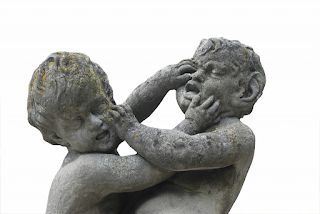In the last half of Genesis, we find a couple of stories about brothers: Jacob and Esau and the sons of Israel.
In Genesis 35, Esau and Jacob are meeting. If I remember correctly, it's the first time they're meeting since Jacob took the birthright, and Jacob is nervous about the meeting. Within my family, there are some brothers who haven't spoken with each other for some time because of past conflicts. When they get together, those conflicts bubble up and create contention.
But thankfully, this wasn't the case here. They both show love, forgiveness, and generosity. And here is an image of their meeting. Having this attitude in our own lives can help us spread this same joy.
"The greatest missionary tool we have is that of demonstrating friendliness, brotherly kindness, harmony, love, and peace in our homes and in all our Church meetings. If we follow the example of Jesus Christ and become true peacemakers, that flood of love will cover the earth as with a blanket" ("Blessed are the Peacemakers"; Burton, 1974).
Then we have the sons of Israel. Joseph was the favored son and was blessed with visions of greatness. As a result, "his brethren envied him" (Genesis 37:11).And here we have a contrasting example of brotherly love. Standing up to the others, Reuben encourages them not to kill Joseph. '"Shed no blood, but cast him into this pit that is in the wilderness, and lay no hand upon him,"' he said, 'so that (Reuben) might (save Joseph) out of their hands, to deliver him to his father again' (Genesis 37:22). Unfortunately, Reuben leaves Joseph with the others, and Joseph is sold into slavery.
While this results in the salvation of Egypt and the House of Israel, the progress made in Egypt could have been made in their homeland.
"We need to be reminded that contention is a striving against one another, especially in controversy or argument. It is to struggle, fight, battle, quarrel, or dispute. Contention never was and never will be an ally of progress" ("No Time for Contention"; Ashton, 1978).
While we should avoid contention, there is another enemy to progress and brotherly love: neglect. "Yet did not the chief butler remember Joseph, but forgat him" (Genesis 40:23). We might decide that in order to avoid contention, we need to just leave the offending party alone. But that doesn't lead to progress either. Joseph was sitting in prison and Egypt was headed for disaster.
Thankfully, Joseph was remembered, and everyone was saved! And then we have these touching scriptures describing their reunions: "And Joseph made haste; for his bowels did yearn upon his brother: and he sought where to weep; and he entered into his chamber, and wept there" (Genesis 43:30). "And he fell upon his brother Benjamin’s neck, and wept; and Benjamin wept upon his neck. Moreover he kissed all his brethren, and wept upon them: and after that his brethren talked with him." (Genesis 45:14-15).




No comments:
Post a Comment